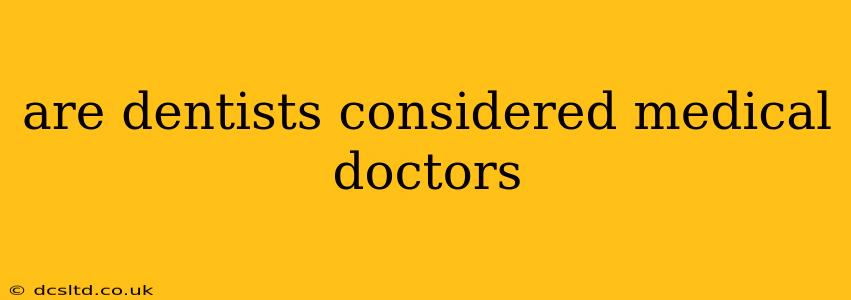The short answer is no, dentists are not considered medical doctors (MDs). While both professions require extensive education and training, they focus on different aspects of healthcare. Understanding the distinction is crucial for patients seeking appropriate care. This article will delve into the differences between dentists and medical doctors, exploring their education, scope of practice, and licensing.
What is the Difference Between a Dentist and a Medical Doctor?
The core difference lies in their area of expertise. Medical doctors (MDs or DOs) diagnose, treat, and manage a vast range of illnesses and injuries affecting the entire body. Their training encompasses internal medicine, surgery, pediatrics, and many other specialties. Dentists (DMDs or DDSs), on the other hand, specialize in the oral cavity – the teeth, gums, jaw, and related structures. Their expertise focuses on preventing, diagnosing, and treating oral diseases and conditions.
What Education Do Dentists Receive?
Becoming a dentist requires rigorous academic preparation. Aspiring dentists typically earn a bachelor's degree before enrolling in dental school, a four-year program leading to a Doctor of Dental Medicine (DMD) or Doctor of Dental Surgery (DDS) degree. This intensive curriculum covers various aspects of dentistry, including:
- Oral anatomy and physiology: A deep understanding of the structures and functions within the mouth.
- Dental materials science: Knowledge of the properties and applications of materials used in dental procedures.
- Operative dentistry: The techniques involved in filling cavities and restoring teeth.
- Prosthodontics: The creation and placement of artificial teeth and dentures.
- Periodontics: The treatment of gum disease.
- Endodontics: Root canal therapy.
- Orthodontics: Straightening teeth.
- Oral surgery: Surgical procedures involving the mouth and jaws.
What Education Do Medical Doctors Receive?
Medical doctors complete a four-year undergraduate degree followed by four years of medical school (MD or DO program). After medical school, MDs then complete residencies, which can last from three to seven years, depending on their chosen specialty. This extensive training provides them with the broad medical knowledge necessary to treat a wide range of conditions.
Do Dentists Have Medical Licenses?
No, dentists do not hold medical licenses. They obtain separate dental licenses, which allow them to practice dentistry within their scope of practice. These licenses are regulated by state boards of dentistry and require passing comprehensive examinations.
What is the Scope of a Dentist's Practice?
A dentist's practice is limited to the oral cavity and related structures. While they may identify some systemic conditions that manifest orally (for example, certain cancers or nutritional deficiencies), they are not equipped to treat these conditions. They would refer patients to appropriate medical specialists for diagnosis and treatment.
Can Dentists Prescribe Medications?
Yes, dentists can prescribe medications, but their prescribing authority is limited to medications relevant to their scope of practice, primarily related to oral health and pain management. This authority differs by state and jurisdiction.
What are the Differences in Licensing and Certification?
Dentists and medical doctors undergo separate licensing processes, governed by different boards and agencies. Medical doctors obtain medical licenses, while dentists obtain dental licenses. This separate licensing reflects the distinct nature of their training and practice.
Are There Any Overlaps in Practice?
While their core practices differ significantly, there can be some overlap, especially in areas like oral surgery, which may require collaboration between dentists and medical doctors. For instance, a dentist might perform a simple extraction, while a medical doctor might be needed for more complex procedures.
In conclusion, while both dentists and medical doctors are highly skilled healthcare professionals, they are distinct professions with different educational paths, licensing requirements, and scopes of practice. Dentists are not considered medical doctors, but they play a crucial role in maintaining overall health and well-being by focusing on oral health.
